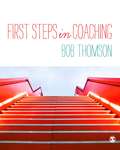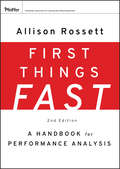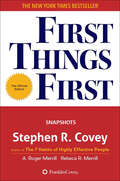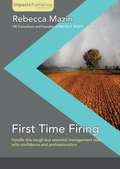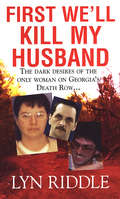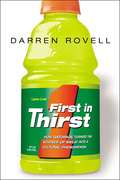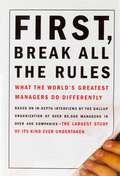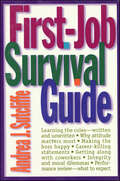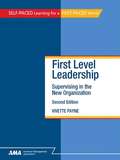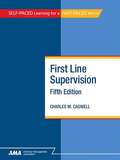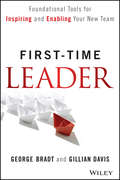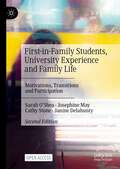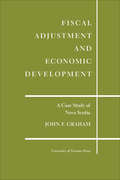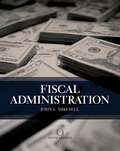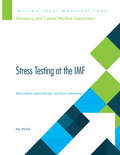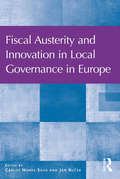- Table View
- List View
First Steps in Coaching
by Bob ThomsonFirst Steps in Coaching is an essential guide for anyone starting out in the coaching profession and for existing coaches seeking to develop their craft. It is a practical introduction to the theory, skills and art of coaching. The book's structure follows the reader's progression from novice to professional coach, making it an indispensable companion every step of the way. Part one - Learning to Walk - sets out the basics of coaching and considers the key skills of listening, questioning and playing back. Part two - Learning to Run - explores a variety of practical and ethical issues, and looks at coaching as a line manager and coaching a team. Part three - Learning to Dance - examines more advanced topics such as the coach's use of their self and the nature of the coach-client relationship. The book: - Uses clear, uncomplicated language throughout - Explains key ideas through brief illustrations from the author's practice and quotes from leading writers on coaching - Contains a wide selection of ideas, models and exercises to stimulate the reader's learning - Encourages students to try things out in conversation, and reflect upon and make sense of their experiences First Steps in Coaching is a must-have book for anyone interested in coaching skilfully, ethically and effectively.
First Things Fast
by Allison RossettThis thorougly revised classic provides guidelines for HR and Training professional on how to quickly determine performance needs before investing precious time and resources. When trainers, consultants, and problem-solvers need to figure out what's wrong with an organization--and they need a solution fast--they need this book.
First Things First: Snapshots
by Stephen R. Covey A. Roger Merrill Rebeca R. Merrill#1 New York Times bestseller “create[s] a new paradigm for taking control of busy lives . . . offer[ing] a ‘principle-centered’ approach to time management” (Library Journal .)Stephen R. Covey’s First Things First is the gold standard in time management books. Covey’s principle-centered approach for prioritizing gives you time management tips that enable you to make changes and sacrifices needed in order to obtain happiness, and retain a feeling of security. First Things First: The Interactive Edition takes Dr. Covey’s philosophy and remasters the entire text to include:VideosEasy to understand infographicsAnalysisand moreThis time-saving version is the efficient way to apply Dr. Covey’s tested and validated time management tips, while retaining his core message. First Things First: The Interactive Edition will help you:Get more done in less timeDevelop and retain rich relationshipsAttain inner peaceCreate balance in your lifeand, put first things first“Time management isn’t enough . . . the real question is knowing what’s important, and Covey and the Merrills draw from a variety of sources to guide you toward determining just that.” —Booklist
First Time Firing
by Rebecca MazinFiring someone is never easy; it shouldn't be. The key to minimizing sweaty palms and the chance of stuttering through a statement is remembering that this is a business decision, and a business conversation. It requires preparation and planning for success. First Time Firing will provide you with clear and practical guidance to making termination decisions and acting on them. It will take you from making that first decision of the process, through preparing notes and recommendations, to delivering the news with confidence. Firing people is a difficult but necessary management task; it is essential that you maintain your professionalism and keep the needs of the business at the forefront of your mind. This hands-on guide is the perfect companion that will help you to do exactly that. Beginning with helpful advice on making a termination decision, HR expert Rebecca Mazin breaks down the process from the initial decision, through to planning and conducting the meeting, and then guides you through the necessary steps afterwards. With real life examples to illustrate best practices, First Time Firing takes a concise and logical approach giving you the confidence to handle a termination. About the Author: With more than 20 years of expertise, Rebecca Mazin formed RECRUIT RIGHT to create usable solutions for employers to meet increasingly complicated human resources challenges. Her clients benefit from clear guidance, tools, and techniques that quickly cut through fads, jargon, and complex regulatory issues. RECRUIT RIGHT consulting, training, and written communications produce measurable results in a wide range of businesses and not-for-profit organizations from small startups to industry giants. Rebecca uses her passion for demystifying human resources issues to write content accessible for business owners, managers, and HR pros. She is the author of The Employee Benefits Answer Book: An Indispensable Guide for Managers and Business Owners published by Pfeiffer in 2010 and the co-author of The HR Answer Book: An Indispensable Guide for Managers and Human Resources Professionals published by AMACOM in 2004 with a revised edition issued in 2011. Her advice and commentary appears in business publications, industry and trade journals, and Rebecca is a featured expert on the award winning www.AllBusiness.com website. Follow Rebecca on Twitter at @thehranswer. Prior to founding RECRUIT RIGHT, she held key management positions at major organizations. Her experience with Millennium Hotels and Hyatt Hotels Corporation built on her work at Owens Corning and the U.S. Federal Government at the National Labor Relations Board. Rebecca is a graduate of Cornell University with a degree in Labor Relations. She is a certified facilitator of Achieve Global training programs. Rebecca is active in the community, where she uses her skills and talents to enhance organizational effectiveness and outcomes. Rebecca was board co-chair for MTS, a non-profit that hired, trained and placed individuals with HIV Aids and has held board positions with The Junior League of Westchester on the Sound. She currently serves on the board of Furniture Sharehouse, Westchester's Furniture Bank.
First Time Tenant
by Patricia BarberStudent accomodation expert Patricia Barber takes you through all the steps from finding the right property, moving in and renting right through to, finally, moving out.Along the way, you will find out what to look for in the tenancy agreement and what it's all going to cost. Learn about the tenancy itself - what to expect from your landlord and your responsibilities as a tenant.You will also learn how to protect yourself from unscrupulous landlords - and most importantly - preserve your deposit.Every aspect of renting is covered, with useful tips and case histories from Patricia Barber's wealth of experience in the lettings industry.
First Utility Ltd.
by John R. Wells Benjamin WeinstockAt the end of 2017 First Utility Ltd. was the largest of the middle-tier domestic energy suppliers in the United Kingdom, serving 808,000 of the country's 27 million households with electricity and gas. In Q1 2017 First Utility captured 3% market share. The company had grown rapidly from 2011 to 2014, doubling in size each year, and CEO Ian McCaig had signaled that he was considering an IPO. However, in 2015 growth slowed, and profits fell by 84%. The same year, the company began expanding into Germany and Poland and building its own billing system. Growth slowed further in early 2016, and First Utility recorded a loss of 12.7 million for the year. Plans for an IPO were shelved. Instead, the company began looking for strategic partnerships to offer new products and services to its UK customer base. Whether First Utility's new geographies and product lines would revive growth was unclear. Meanwhile, in May 2017, CEO McCaig announced that he would step down in September. In December 2017, the company announced that Royal Dutch Shell would acquire First Utility for an undisclosed sum. The deal was approved in February 2018, and First Utility was rolled into Shell's New Energies division.
First We'll Kill My Husband
by Lyn RiddleA Murdered Husband. . . Gulf War veteran Doug Gissendaner would do anything for a friend, a stranger, or the wife who broke every rule in the marriage book. Now, investigators were scouring the Georgia woods not far from Doug's home. They'd already found the charred wreckage of his car. They knew they were looking for a body. . . A Hitman Who Killed For Love. . . Gregory Owen had been having an on-again, off-again affair with Doug's wife for years. Then Kelly Gissendaner told Greg it was time for her husband to die. With a knife and a plan, Greg forced Doug to drive into the woods. When Greg finished his savage, cold-blooded deed, Kelly showed up to make sure Doug was dead. A Woman On Death Row. . . This is the astounding true story of the only woman on Georgia's Death Row and the chilling, account of how she got there. From the hold Kelly had over a good and decent man to her dramatic, controversial trial, First We'll Kill My Husband captures the lies, schemes, and manipulations of a woman totally bent on murder. . . Includes 16 pages of shocking photos! Lyn Riddle is a freelance writer and journalist whose work regularly appears in The New York Times, the Los Angeles Times, and The Atlanta Constitution. She is the author of Family Blood: The Murder that Shattered an All-American Home and Ashes to Ashes. She lives in Simpsonville (near Greenville), SC.
First in Thirst: How Gatorade Turned the Science of Sweat Into a Cultural Phenomenon
by Darren Rovell*Selected as one of Soundview Executive Book Summaries's the "30 Best Business Books" of the year.* Remember the Cola Wars, with Coke and Pepsi battling it out year after year for supremacy in the soft drink market? Or what about the Burger Wars, the legendary slugfests between McDonald's and Burger King? Then of course, there were the Sports Drink Wars. If you blinked, you might have missed them, because Gatorade has swiftly and decisively fended off every would-be rival. Although a few other brands hold slim market shares, the fact is that Gatorade single-handedly created the sports drink industry 40 years ago and has absolutely ruled it ever since. But Gatorade is more than just a triumph of branding. First, it's a trusted product that has been scientifically proven to do what it claims to do. Second, Gatorade is an enthralling story, brought to life in bright color and sharp detail in First in Thirst. Author Darren Rovell, a skilled, objective, and passionate journalist, chronicles every astonishing milestone of the company's history. With unprecedented access to the inventors, the marketers, the analysts and observers, and key company figures past and present, Rovell recounts the sweat-drenched University of Florida football practices, the first (unpalatable) prototypes, and the commercial and financial interest that quickly took hold following the drink's first on-field successes. Then came the advertising, sponsorships, product placements (many of them fortuitous), and finally the two milestones that cemented Gatorade's iconic status once and for all -- the ubiquitous Gatorade bath and the Michael Jordan ""Be Like Mike"" endorsement deal. With refreshing candor, First in Thirst also offers an inside look at the negotiations, battles, lawsuits, mergers and acquisitions, product strategies, lucky breaks, and even the missteps (there have not been many) that have attended Gatorade's reign as the 800-pound gorilla of the sports-drink scene. Rovell places the reader inside labs and brainstorming sessions, at board meetings and ad shoots, on the sidelines and in the dugouts, even in the winner's circle at NASCAR events -- where Gatorade manages maximum exposure even at tracks whose official sponsors include chief rival POWERade. The book identifies the nine Gatorade Rules, business principles that have helped Gatorade become one of the most dominant brands ever. By adhering to these principles, businesses in other industries may achieve greater brand recognition and market share. Long before America knew what ""deep-down body thirst"" was, a team of university scientists had already invented something to quench it. First in Thirst is the story of the product and the company, and of America's fascination with the one and only Gatorade.
First, Break All the Rules: What the World's Greatest Managers Do Differently
by Marcus Buckingham Curt CoffmanGallup presents the remarkable findings of its revolutionary study of more than 80,000 managers in First, Break All the Rules, revealing what the world's greatest managers do differently. With vital performance and career lessons and ideas for how to apply them, it is a must-read for managers at every level.The greatest managers in the world seem to have little in common. They differ in sex, age, and race. They employ vastly different styles and focus on different goals. Yet despite their differences, great managers share one common trait: They do not hesitate to break virtually every rule held sacred by conventional wisdom. They do not believe that, with enough training, a person can achieve anything he sets his mind to. They do not try to help people overcome their weaknesses. They consistently disregard the golden rule. And, yes, they even play favorites. This amazing book explains why. Gallup presents the remarkable findings of its massive in-depth study of great managers across a wide variety of situations. Some were in leadership positions. Others were front-line supervisors. Some were in Fortune 500 companies; others were key players in small entrepreneurial companies. Whatever their situations, the managers who ultimately became the focus of Gallup's research were invariably those who excelled at turning each employee's talent into performance. In today's tight labor markets, companies compete to find and keep the best employees, using pay, benefits, promotions, and training. But these well-intentioned efforts often miss the mark. The front-line manager is the key to attracting and retaining talented employees. No matter how generous its pay or how renowned its training, the company that lacks great front-line managers will suffer. The authors explain how the best managers select an employee for talent rather than for skills or experience; how they set expectations for him or her -- they define the right outcomes rather than the right steps; how they motivate people -- they build on each person's unique strengths rather than trying to fix his weaknesses; and, finally, how great managers develop people -- they find the right fit for each person, not the next rung on the ladder. And perhaps most important, this research -- which initially generated thousands of different survey questions on the subject of employee opinion -- finally produced the twelve simple questions that work to distinguish the strongest departments of a company from all the rest. This book is the first to present this essential measuring stick and to prove the link between employee opinions and productivity, profit, customer satisfaction, and the rate of turnover. There are vital performance and career lessons here for managers at every level, and, best of all, the book shows you how to apply them to your own situation.
First-Job Survival Guide: Learning the Rules - Written and Unwritten
by Andrea J. SutcliffeThe lowdown on what it takes to keep-and make a success of-that first job, this book speaks to beginners like the mentor they don't yet have, telling them in plain language how to make their first year a positive experience: from making the boss happy to getting along with coworkers, coping with moral dilemmas, and knowing when it's time to move on.
First-Level Leadership: Supervising in the New Organization
by Vivette PayneFirst-level management…it’s where the most critical leadership needs must be met! Now more than ever, leadership is the determining factor in successful organizations. Building and sustaining a competitive advantage requires leadership at all levels, not just the top. First-level supervisors are in a unique position to provide this new leadership. This book has been developed for the first-level supervisor charged with providing leadership in a dynamic business environment. Using assessments, activities, and case studies, you’ll learn how to manage the transition from supervisor to first-level leader, motivate and retain employees, lead with impact and influence, manage project and virtual teams, lead for competitive advantage, and craft and implement a plan for managing change. You’ll learn the attitudes, skills, and behaviors needed to lead and prosper in your organization. You will learn how to: • Make the shift from supervisor to first-level leader • Identify key retention factors and create a climate for motivating and retaining employees • Recognize and implement key influence strategies • Build, lead and motivate project and virtual teams for marketplace success • Identify and exceed customer expectations • Plan for process improvement and strive for added value • Manage the scope and speed of change • Identify strategies to help you develop influence and communicate your vision • Master techniques to help you better understand your organization’s business, meet customer expectations, and ensure greater productivity and efficiency
First-Line Supervision, Fifth Edition
by Charles M. CadwellJoin the thousands of supervisors who have stepped up to their new roles with this self-study classic. Join the thousands of supervisors who have learned the ropes with this classic book on mastering supervisory skills. Completely revised and updated, First-Line Supervision, Fifth Edition gives you all the confidence and know-how you need to achieve and maintain supervisory success in the contemporary workplace. Filled with expert information on all the basics of the job—from managing time and stress to motivating and counseling employees— First-Line Supervision, Fifth Edition is light on business-school jargon and heavy on real-world guidance. Using self-assessments, action plans and relevant work examples, it shows you exactly how to apply crucial supervisory skills in your own workplace. Whether a novice or experienced supervisor, you’ll find First-Line Supervision, Fifth Edition inspirational, instructive and encouraging. Just think of the book as a trusted friend—one that will lead you step-by-step along a new path to success and satisfaction. You will learn how to: • Make a successful transition from staff to supervisor • Develop your own leadership style • Establish a partnership with your boss • Give feedback to improve performance • Build a top-performing team • Manage communication technology • Develop the skills to manage a diverse work force • Learn techniques for managing virtual employees and employees at multiple and distant locations
First-Time Landlord
by Janet Portman Marcia Stewart Ilona BrayWhether you're ready for a new entrepreneurial opportunity or considering renting out a home instead of selling, you'll need to learn the basics of being a landlord. Let First-Time Landlord show you how to start your landlording business and maintain it in your spare time. Get the concise information you need to start making money with a single-family home, written for property owners with little business savvy -- and even less time and patience. Learn how to rent out your property lawfully and safely with valuable information on: how to determine whether the property will turn a profit landlord business basics finding the right tenants preparing and signing the lease handling repairs complying with your state's rental laws dealing with problem tenants, and preparing for sale of the property From timely tips to true stories from successful landlords, First-Time Landlord is an indispensable book for property owners who want to rent out a single-family home without the hassle -- quickly, efficiently and legally.
First-Time Landlord
by Janet Portman AttorneyWhether or not you call yourself a "landlord", when you rent out a house you'll want to do it right! The "Landlording 101" course for new rental property owners who are first-time landlords by way of an inheritance, divorce, investment, purchase for a family member, or a move to a new house. 90% of small properties are owned by individual landlords, and millions in this group are balancing their landlord responsibilities with their daytime careers. First - Time Landlord provides concise information for those with little business savvy and less time and patience to become big-time real estate investors, but who wish to make money on their new property while renting it out lawfully and right! It covers: How to determine whether or not the property will turn a profit Landlord business basics Finding good tenants Preparing and signing a lease Handling Repairs Complying with applicable rental laws Dealing with problem tenants Preparing for sale of property Containing tips, true stories, and shared first-time experiences, First - Time Landlord is an indispensable book for the new landlords of today's dominant rental housing market.
First-Time Landlord: Your Guide to Renting out a Single-Family Home
by Janet Portman Marcia Stewart Ilona BrayWhether you're ready for a new entrepreneurial opportunity or considering renting out a home instead of selling, you'll need to learn the basics of being a landlord. Let First-Time Landlord show you how to start your landlording business and maintain it in your spare time. Get the concise information you need to start making money with a single-family home, written for property owners with little business savvy -- and even less time and patience. Learn how to rent out your property lawfully and safely with valuable information on: how to determine whether the property will turn a profit landlord business basics finding the right tenants preparing and signing the lease handling repairs complying with your state's rental laws dealing with problem tenants, and preparing for sale of the property. From timely tips to true stories from successful landlords, First-Time Landlord is an indispensable book for property owners who want to rent out a single-family home without the hassle -- quickly, efficiently and legally.
First-Time Landlord: Your Guide to Renting out a Single-Family Home
by Janet Portman Marcia Stewart Ilona BrayThe 101 on earning rental income from a single-family home Do you own a house you’d like to rent out rather than sell? It’s a common scenario in today’s market, especially if you’ve inherited a house, are moving to another home, or are buying an investment property. And it may mean you’re about to be a first-time landlord. Follow the advice in this book to ease into your new role and earn substantial profits while avoiding costly mistakes. Learn your legal obligations. Estimate costs and profits. Choose good tenants and avoid problem ones. Make the most of valuable tax deductions. Handle repairs and property management tasks. The 5th edition is updated to cover major legal changes, in particular how the Tax Cuts and Jobs Act created pass-through deductions that can benefit landlords. Includes sample forms and budget worksheets.
First-Time Leader
by George B. Bradt Gillian DavisFirst-time leaders get motivational and planning tools from top executive coaching firmsThe First-Time Leader provides basic frameworks, processes, and tools to help first-time leaders and their teams deliver better results faster. Leading is about inspiring and enabling others to do their absolute best, together, to realize a meaningful and rewarding shared purpose. Authors George Bradt, Managing Director of PrimeGenesis, and Gillian Davis, Managing Director of AlanKey, show how to achieve these results through the BRAVE acronym: Behaviors, Relationships, Attitudes, Values, Environment. Learn the three stages of team development, and get advice for specific leadership situations including onboarding yourself, onboarding others, and crisis management.Offers a way of thinking about leadership and a structure for action to help first-time leaders lead at both overall conceptual and tactical levelsIncludes downloadable tools that are easily adaptable for each leader's specific contextContains illustrative examples and stories from a range of experienced leaders and experts to help guide first-time leaders through things they may not have experienced themselvesThe First-Time Leader shows new leaders what to do next, later, never, why, and how. It's an indispensible guide for stepping up and inspiring others to come together for success.
First-in-Family Students, University Experience and Family Life: Motivations, Transitions and Participation
by Sarah O'Shea Josephine May Cathy Stone Janine DelahuntyThis open access book, now in its second edition, offers a comprehensive overview of the experiences of First in Family (FiF) or first-generation students in higher education. It draws upon narratives of students and their family members and spans the entire university student life cycle (pre-entry, commencement, progression and graduation) with a focus on specific cohorts including mature-aged students, parents or carers, as well as the differentiated experiences of male and female learners. With research drawn from three major research projects and including over 650 FiF students from across all Australian states and territories, as well as Europe, this wealth of perspectives provides unique insights into the lived reality of attending university in contemporary higher education settings. The book is written for a broad audience and will appeal to those working in universities, as well as family members and students who may be contemplating participating in higher education.
Fiscal Adjustment and Economic Development: A Case Study of Nova Scotia
by John F. GrahamThis study is an attempt to find a solution to the problem of fiscal adjustment between a province or a state and its municipalities–a pressing problem throughout Canada and the United States and in many other countries in view of the great disparities in the revenue-raising capacity of municipalities, their limited tax bases, and the pressure on them to provide higher levels of public services. The principles developed are of general applicability, but their use is illustrated by using Nova Scotia as a case study. The first of the series "Atlantic Provinces Studies" established by the Social Science Research Council of Canada to encourage research on the economic and social problems of the Atlantic Provinces.
Fiscal Adjustment for Stability and Growth
by James DanielA report from the International Monetary Fund.
Fiscal Adjustment in Sudan Size, Speed, and Composition
by Kenji Moriyama S. M. Ali Abbas Abdul NaseerA report from the International Monetary Fund.
Fiscal Administration Analysis and Applications for the Public Sector
by John L. MikesellEver wonder how federal finance really works? FISCAL ADMINISTRATION, Ninth Edition, shows you how public budgets operate and gives you the opportunity to crunch the numbers. With actual data from the U. S. federal budget, including its breakdown, you can see for yourself how policymakers allocate money. Each chapter illustrates concepts and issues with case studies from the private sector as well as from public finance.
Fiscal Affairs Department How-To Notes (Departmental Papers)
by International Monetary FundA report from the International Monetary Fund.
Fiscal Austerity and Innovation in Local Governance in Europe
by Carlos Nunes Silva Ján Bu?ekFollowing the financial crisis and subsequent impacts of economic slowdown and austerity, the emergence of new local governance models and innovation is a very timely issue. The same goes for identifying new types of funding schemes and fiscal models prompted by austerity with the reduction in financial resources for local governments. This book offers a broad perspective on some of the organizational and financial problems faced by cities and local governments across Europe and analyses the reactions and reforms implemented to address current economic and public finance conditions. The geographical coverage of the case studies, multidisciplinary background of the contributing authors and focus on a multiplicity of issues and challenges that confront local governments, not just financial issues as is often the case, means this book is relevant to a wide readership. The book is written for post-graduate students, advanced undergraduates, and researchers in the multidisciplinary field of local government studies (Public Administration, Geography, Political Science, Law, Economy and Sociology), as well as practitioners working in local government institutions.
